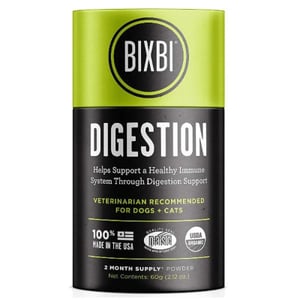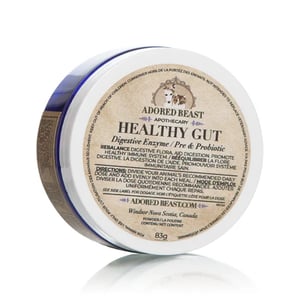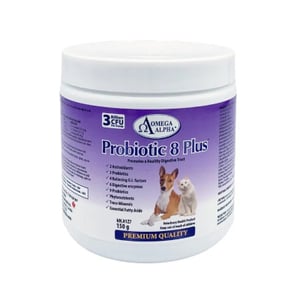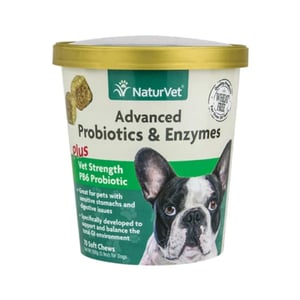
If you are trying to boost your dog's health, manage skin and coat issues, or help your dog achieve a healthy weight, then the best probiotics for dogs are a great option. Your dog's overall health starts in the gut, so support them with digestive aids like probiotics, prebiotics, and digestive enzymes.
Probiotics for dogs are a key player in ensuring your dog's digestive health. Just as in humans, a healthy gut is crucial for a dog's overall well-being. That's why prebiotics, digestive enzymes and probiotic supplements are so important.
As a loving pet owner, you want your dog to live a long and healthy life. And a big part of that is ensuring they're getting the right nutrients in their diet. But with all the different types of food and supplements out there, it can be difficult to know what's best for your dog.
Please keep reading to discover everything you need to know about these powerful digestive health boosters and how to incorporate them into your pup's diet.
What Are Prebiotics for Dogs?
Prebiotics are a type of dietary fibre that acts as fuel for probiotics (good bacteria) in the gut. By feeding the good bacteria, prebiotics help promote a healthy balance of gut flora. This is important for many reasons, including supporting immunity, preventing inflammation, and aiding digestion.
In order to be effective, prebiotics must be resistant to the digestive process so that they can make it to the large intestine intact. There, they are fermented by gut bacteria and turned into short-chain fatty acids (SCFAs), which are a source of energy for cells in the colon.
A common source of prebiotics for dogs is chicory root. Learn about the benefits of Chicory for Dogs and why it's a great ingredient to see in your dog's food.
SCFAs play other important roles, such as reducing inflammation in the dog's body, supporting a healthy immune system, and maintaining the integrity of the gut barrier. They may also help prevent diseases like obesity, diabetes, and cancer.
Many raw dog foods include prebiotics to ensure optimal digestion and absorption of nutrients. Here are a few dog foods that offer superior digestibility from prebiotics:
What Are Probiotics for Dogs?
Probiotics are live microorganisms (bacteria and yeasts) that are beneficial for digestive health. They're similar to the good bacteria that naturally live in the digestive system and can help restore the balance of gut flora when it's been disrupted. That's why probiotics are often referred to as "friendly," "good," or "healthy" bacteria.
Probiotics work with the good bacteria in your dog's gut to keep harmful bacteria in check. They also help break down food, absorb nutrients, support immunity, and contribute to a healthy digestive system.
The relationship between prebiotics and probiotics is symbiotic, meaning they work together to support total health. Prebiotics act as food for probiotics, while probiotics help prebiotics achieve their full potential in the gut.
The best probiotics for dogs are a helpful part of a complete diet, and tasty meal toppers like Goat's Milk for Dogs can ensure appropriate probiotic inclusion.
What Are Digestive Enzymes?
Enzymes are proteins that help break down food into nutrients so that the body can absorb them. Dogs produce their own enzymes, but their amount and activity can decline with age. This is one reason why senior dogs often have trouble digesting food properly.
Senior dog foods are often formulated with easier-to-digest proteins and other digestion-friendly ingredients to ensure that older dogs are getting the nutrients they need to fight the effects of aging.
Dogs produce three main types of enzymes: proteases, which break down proteins; amylases, which break down carbohydrates; and lipases, which break down fats. Cellulase is another type of enzyme that helps break down fibre, but dogs don't produce this naturally.
The pancreas is the primary organ responsible for producing enzymes. These enzymes are then secreted into the small intestine, where they help break down food.
If the pancreas isn't functioning properly, or if not enough enzymes are being produced, dogs can experience poor digestion, nutrient deficiencies, and other health problems.
Dietary sources of enzymes can be found in many foods, like pineapple and mango. Find out which of your dog's favourite fruits and vegetables might be offering more nutrition than you thought.
Do Dogs Need Prebiotics, Probiotics, and Enzymes?
Now you know what prebiotics, probiotics, and enzymes are, let's look at why you may want to add them to your furry friend's diet. As mentioned earlier, gut health is crucial for dogs (and humans!) of all ages. A healthy gut supports immunity, digestion, nutrient absorption, and more.
Adding these three ingredients to your canine's diet is a simple way to support their overall health and is especially useful for dogs with sensitive stomachs. Prebiotics, probiotics, and enzymes can be found in a wide variety of whole foods, including fruits, vegetables, and dairy products. They can also be given to dogs in supplement form.
Whole food sources of prebiotics, probiotics, and enzymes benefit dogs of all ages and can be easily added to their diet. Digestive supplements for dogs, like dog probiotics, are also a good option, especially for dogs recovering from illness or having specific needs such as inflammatory bowel disease.
In the next section, we'll share some of the best prebiotic, probiotic, and digestive enzyme-rich foods for dogs. We'll also provide tips on choosing high-quality digestive supplements to support your dog's immune health and overall wellness.
Probiotics and Prebiotic Foods for Digestive Health

Many whole food sources are rich in prebiotics, probiotics, and enzymes and can be found in many commercial dog foods or can be added to your pet's diet as a treat or meal topper. Take a look at your pet's diet and see if it includes any of these natural digestion-friendly foods.
Prebiotic-rich foods
These can be given to your dog in small amounts or mixed into their food. Many of the food source choices provide dietary fibre, unlike probiotics.
Here are a few of the best options:
-
- Pumpkin
- Butternut squash
- Sweet potato
- Medicinal mushrooms
- Dandelion greens
- Chicory Root
Probiotic foods
Start with small amounts of probiotic-rich foods or a probiotic supplement and increase gradually over time to allow your dog's digestive system to adjust and receive the same benefits. Check out the following foods with probiotics for dogs.
-
- Yogurt
- Goat's milk
- Kefir
- Bananas
- Apples
- Seaweed
- Fermented vegetables
Raw goat's milk is a tasty meal additive for dogs. Check out the amazing Benefits of Goat's Milk for Dogs and learn how to feed this delicious food topper.
Enzyme-rich foods
Certain foods can help support your dog's production of enzymes and improve its overall health. The naturally occurring sugars will appeal to your pet just as human foods do. They are also a good source of soluble fibre. These include:
-
- Papaya
- Pineapple
- Ginger
- Sprouted Seeds
Lots of fruit is safe to feed and can add vital nutrients and enzymes to your dog's diet. Check out the top 10 Fruits Safe for Dogs for more benefits and feeding tips.
When introducing your dog to new foods, always start with small amounts and increase gradually over time. It's also a good idea to speak with your veterinarian before making any changes, especially if your dog has any health concerns.
A complete and balanced diet is vital to your pet's health, so before you try to fix your dog's health issues with supplements and additives, make sure you are feeding high-quality natural dog food. Choose high-fiber foods and avoid artificial sweeteners.
Best Probiotics for Dogs
Adding a high-quality digestive supplement is an easy way to help provide prebiotics, probiotics, and digestive enzymes that support gut health. Speak with your veterinarian and choose a dog probiotic that’s appropriate for your dog’s age, weight, and needs.
Look for digestive supplements that contain high-quality ingredients and no unnecessary fillers, artificial ingredients, or preservatives. When in doubt, choose a product that's been certified by a third-party organization, like the National Animal Supplement Council (NASC).
Some of the best dog probiotic supplements combine prebiotics, probiotics, and digestive enzymes. These formulas help support a healthy gut and everyday wellness. These natural supplements are offered in powders or chewable tablets that you can add to meals to supplementing easier and hassle-free.
Here are five popular probiotic digestive aids to support your dog’s gut health and complement their diet:
1. Purina FortiFlora Probiotic Supplement

Purina FortiFlora is a veterinarian-recommended probiotic powder with a specific strain to help support normal intestinal microflora and everyday digestive health. Single-serve sachets are easy to sprinkle over meals for daily support.
2. Bixbi Digestive Supplement

Using the natural health properties of mushrooms, Bixbi Digestive Supplement is formulated to support a healthy gut environment and normal GI balance. It may help maintain regular digestion, support immune function, and help with normal stool quality, with the added benefit of fresher breath.
3. Adored Beast Apothecary Healthy Gut

Combining prebiotics, probiotics, and enzymes, Adored Beast Apothecary Healthy Gut helps to rebalance your dog's gut microbiome to support digestion and promotes a healthy immune system. The multi-strain probiotic blend is geared towards the unique digestion of canines,
4. OmegaAlpha Probiotic 8 Plus

Omega Alpha Probiotic 8 Plus is one of our best overall digestive supplements for dogs. Using 8 beneficial strains of probiotics, natural sources of fibre, and natural enzymes can help to improve digestive health, manage symptoms like gas and bloating, and boost immunity.
5. NaturVet Advanced Probiotic & Enzymes

Giving your dog supplements can be tricky if they are picky about their food. NaturVet Advanced Probiotics & Enzyme Soft Chews can digestive support in the form of an easy-to-feed and delicious treat. These treats contain prebiotics, probiotics, and enzymes for a total gut health boost.
6. Open Farm Probiotic Supplement Chews

Open Farm soft probiotic chews made with 100% traceable, functional ingredients to help support normal gut flora, healthy digestion, and regular bowel movements. They are vet-formulated and easy to give. Each jar contains 90 chews for daily use in dogs of all ages.
7. Thrive Pro-Gut Probiotics Fusion

This probiotic blend offers digestive enzymes, fibre agents, vitamins, and minerals formulated to help support a healthy digestive tract. Thrive Pro-gut is suitable alongside any diet and simple to mix with food for convenient, daily gastrointestinal support.
8. V Supplements Probiotic+ Chews

Tasty and convenient, V Supplements Probiotic+ Chews feature Bacillus coagulans plus chicory-root prebiotic to help support balanced intestinal flora, daily digestion, and normal immune function. Picky eaters love V Supplements’ treat-style format.
9. Baci+ Probio+ for Dogs

Pre- and probiotic support in one, Baci+ Probio+ for Dogs helps maintain balanced gut flora, regularity, and everyday comfort. Baci+ Probio+ for Dogs offers a straightforward daily format that fits easily into any routine.
10. WellyTails Digestion + Immunity

A powdered blend with multiple probiotics and digestive enzymes, WellyTails Digestion + Immunity helps support normal digestion and immune function. Sprinkle WellyTails over meals for consistent, routine gut support without changing your dog’s usual food.
Best Fibre Supplement for Dogs
Another useful tool to support digestion is including healthy digestive fibre in your dog's diet. When combined with the best probiotics for dogs, digestive fibre can help regulate digestion, ensuring your dog can maintain a healthy gut flora.
Diggin Your Dog - Firm Up! Pumpkin Supplement

If you are looking for a quick and easy way to correct minor digestive upsets and support consistent and healthy digestion, try Firm Up! This dehydrated, powdered pumpkin supplement is natural, tasty, and effective. Add it to dog foods or feed as a treat.
Benefits of Prebiotics and Probiotics for Dogs
Without a doubt, prebiotics and probiotics for dogs provide health benefits for the canine's gut and overall well-being. Some are obvious, but you might be surprised to learn some of the lesser-known benefits of including pre- and probiotics in your pet's diet.
-
- Digestive Health: Probiotics and prebiotics promote a healthy balance of gut microbes in dogs, aiding in digestion and preventing gastrointestinal issues such as diarrhea and constipation. The canine gut is prone to digestive disorders, so your dog's stomach will thank you as the pup's digestive issues start to ease.
- Boosted Immune System: By maintaining a balanced gut flora, probiotics and prebiotics enhance the dog's immune system, helping them fight infections and diseases more effectively.
- Improved Nutrient Absorption: A balanced gut promotes better absorption of essential nutrients from food, ensuring dogs receive maximum nutrition from their diet. Pet owners notice an improvement in their dog's beneficial microorganisms, and the dog's weight can even balance out.
- Reduced Allergies: Probiotics and prebiotics can help alleviate allergic reactions in dogs by modulating the immune response and reducing inflammation.
- Oral Health: Probiotics contribute to a healthier mouth environment, potentially reducing bad breath, plaque, and gum disease.
- Stress and Anxiety Relief: The best probiotics for dogs and prebiotic supplements have been linked to lower stress levels in dogs, which can be especially beneficial for anxious pets.
- Management of Inflammatory Bowel Disease (IBD): Probiotics, in particular, can aid in managing the symptoms of IBD in dogs, helping to reduce inflammation and discomfort in the gastrointestinal tract. Probiotics in dogs can help ease digestive upset and balance the gut-brain axis. Your dog's intestinal tract will improve as the gut microbiome balances and the stomach acids are reduced.
- Prevention of Yeast Infections: Probiotics and prebiotics help maintain a balanced pH level in the gut, preventing yeast overgrowth and related infections.
- Support During Antibiotic Treatment: Probiotics for dogs can counteract the negative effects of antibiotics by replenishing the beneficial bacteria in the gut that may be depleted due to medication, illness, or poor eating habits.
- Overall Well-being: Maintaining a healthy gut balance contributes to a dog's overall well-being, ensuring they are happier, more energetic, and less prone to various health issues
Does Your Dog's Gut Health Need a Boost?
If you're looking for ways to support your dog's gut health, prebiotics, probiotics, and digestive enzymes are all excellent tools. These ingredients can be found in whole food sources or natural supplement forms at Homesalive.ca.
Remember that supplements can offer a simple method for including more digestive support in your dog's daily diet, but they can't compensate for an inappropriate or poor-quality diet. Always start by assessing your pet's food before adding supplements or medications.
Frequently Asked Questions about Probiotics for Dogs
What are prebiotics and probiotics for dogs?
Prebiotics are non-digestible fibres that promote the growth of beneficial gut bacteria. Probiotics are live beneficial bacteria, and enzymes help break down food to soothe sensitive stomachs and prevent disease.
Why might my dog need prebiotics, probiotics, or enzymes?
These foods and supplements can aid your furry friend's overall digestive health, support gut health, and improve absorption within the gastrointestinal system.
Can I give my dog human prebiotics, probiotics, or enzymes?
It's not recommended, as veterinary medicine has shown the formulations and strains of these supplements for dogs differ from those for humans.
Are there any risks or side effects associated with these supplements?
When used as directed, these supplements are typically safe. Talk to your vet to ensure that it's safe for your dog to take digestive supplements.
How do I choose the right prebiotic, probiotic, or digestive enzyme supplement for my dog?
Your veterinarian can provide guidance based on your dog's specific needs, health conditions, and dietary requirements.
How should I introduce these supplements to my dog's diet?
It's best to follow the manufacturer's and your veterinarian's instructions for introducing and administering these supplements.
.png?width=200&height=66&name=logo%20(1).png)













